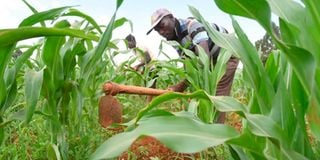Embrace new breeding techniques for a sustainable food future

Farmers weed maize in Uasin Gishu County in 2021.
In a world grappling with the twin challenges of a burgeoning population and the relentless impacts of climate change, ensuring food security has become a paramount concern. With the global population projected to reach 9.7 billion by 2050, according to Food and Agriculture Organization statistics, the demand for food will soar, placing immense pressure on our already strained agricultural resources.
The effects of climate change, resource depletion, biodiversity loss, and the development of new pests and diseases will heavily impact the need to accelerate production and food security. If this situation were to remain unbridled it may exacerbate agricultural production shortfalls and food insecurity, particularly in regions like Africa.
Throughout history, technological innovation has played a pivotal role in addressing humanity's most pressing needs. From agriculture to medicine to engineering, advancements in various fields have offered solutions to complex problems, propelling societies forward.
Yet, it's worth noting that groundbreaking innovations often face initial skepticism, largely due to fears about their potential impact on our way of life and the proliferation of misinformation.
Crop quality
Traditional breeding methods have long been instrumental in enhancing crop quality and productivity. Techniques such as crop domestication, hybridisation, and mutagenesis have yielded significant improvements in agricultural yields. However, these methods are time-consuming and often lack precision.
Enter genome editing technology, a revolutionary tool that promises to revolutionize crop breeding for the better. Utilising techniques such as Zinc Finger Nucleases (ZFNs), Transcription Activator-Like Effector Nucleases (TALENs), and the CRISPR/CAS9 system, scientists are now able to precisely edit specific genes to confer desirable traits in plants.
Of these, CRISPR/CAS9 stands out as the most promising tool for precise gene editing in plants. Inspired by the bacterial immune system, CRISPR/CAS9 enables scientists to target and tweak genes with unprecedented accuracy. By harnessing this technology, researchers can enhance crop resilience, production, and productivity, improve nutritional profiles, and boost yields, all with minimal disruption to the plant's genome.
Unlike genetically modified organisms, which entail the insertion of foreign genes into an organism's genome, gene-edited crops undergo targeted modifications that mimic natural mutations. Already, CRISPR/CAS9 is being deployed to tackle a myriad of challenges in agriculture, from enhancing stress tolerance to improving production and nutritional content.
In Africa, researchers are exploring its potential to bolster resistance to pests/parasites and diseases like Striga in sorghum and banana wilt in bananas, as well as to enhance yields and nutritional content in staple crops like rice and maize.
Africa Harvest Biotech Foundation International (Africa Harvest) and the Network of African Science Academies, in partnership with CropLife International, have been instrumental in driving the adoption of genome editing technology for agricultural progress in Africa.
Together, they have led research initiatives, facilitated capacity-building programs, and advocated for policy frameworks that support the responsible integration of genome editing. Africa Harvest has focused on research tailored to African agriculture, empowering local scientists through capacity building and policy advocacy for the adoption of genome editing technology for enhanced food security in Africa.
NASAC has played a vital role in advocacy, engaging policymakers and stakeholders to ensure regulatory frameworks balance innovation with safety and ethics. Through their collaboration, these organizations have not only accelerated the advancement of gene editing in Africa but have also laid the foundation for sustainable agricultural development that enhances food security and prosperity continent-wide.
In conclusion, embracing new breeding techniques, particularly genome editing, holds immense promise for securing our food future in a rapidly changing world. By leveraging the power of technology responsibly, we can overcome existing challenges and pave the way for a more sustainable and resilient agricultural sector.
Mr Aseta is a botanist, and project manager at Africa Harvest Biotech Foundation International. Dr Magomere, PhD is a genetics researcher, is a lecturer at Kenyatta University.




